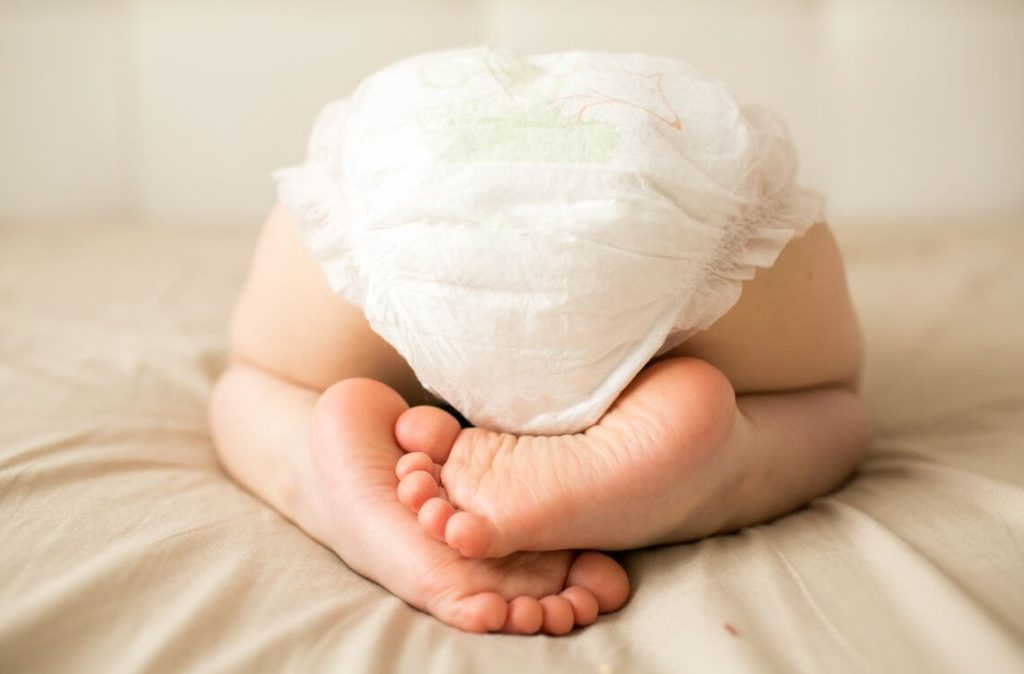Baby poop is part and parcel of caring for your child. As tiresome as it is to deal with, it can be a useful tool in telling you what you need to know about your baby’s health.
The First Poop
The very first time your baby poops may be quite shocking.
Instead of the normal yellowish-brown stools you are expecting, something else altogether lies in store.
The first poop is a dark green sticky substance called meconium. It is thick and tar-like; filling up the baby’s intestine during the intrauterine period.
Meconium is made up of cells, protein, fats, and intestinal secretions such as bile.
It is a normal occurrence and while startling, poses no harm to your baby.
Sometime meconium is passed before the baby is delivered; which may happen due to stress during labour.
If it is inhaled while in the womb, it may cause meconium aspiration syndrome which can be fatal.
It is a leading cause of newborn death but can be prevented by suctioning out the fluids from the airways after birth.
After 24 hours all meconium should have passed. For the next few days your baby will be passing transitional stools.
Transitional stools are slightly dark, greenish yellow and loose with a seedy texture.
Traces of blood and mucus are normal as your baby may have swallowed some during the delivery.
They last from three to four days and may vary greatly in appearance. If you have any concerns but are not sure if it is normal or not, send a picture to your paediatrician.
What Makes Baby Poop Normal
There is wide range of what is considered normal when it comes to baby’s poop.
It is easy to get worried when we see something a little odd in their diapers but do not panic before knowing what it is.
Here is how you can tell.
Colour
The colour of baby poop can vary from white to black. The colours serve as indicators of your baby’s health and diet.
Most often it will be a brownish to greenish colour. This is a good sign however if combined with an especially foul smell and odd texture it may be worth checking out.
Consistency and Texture
Baby poop is softer and looser than older children. If it is soft, slightly runny and a little seedy then you are on the right track.
Breastfed babies tend to have seedier stools than formula fed ones.
Odd Substances
Sometimes there is blood in our baby’s poop. This is very alarming but there are explanations.
They may be allergic to something in their mother’s diet which is transferred through breast milk.
One way to check is to cut out common allergy food from your diet and see the effects on your baby.
It could also be something in their formula. Be sure to check with a doctor if the formula your baby is drinking is a good choice for them, as some babies can be extremely sensitive.
Mucus is also quite normal in babies’ poop. There is no negative indication there unless there is a very large amount.
If your baby passes solid objects that they have accidentally swallowed, it is a good idea to take them for an examination to ensure their intestines are not scratched or harmed.
Constipation and Diarrhoea
Constipation can happen to anyone, and is not too much of a problem in infants. More often than not a proper diet will cure the constipation in a day or two.
Diarrhoea on the other hand is more of a problem. If your baby’s stool is watery, more frequent and has a foul smell this is a sign to get them checked.
It is more serious than constipation as it could be caused by a virus and can cause dehydration among other side effects.
How Often Your Baby Should Be Pooping
Your baby may just poop once on the first day, but before you sigh in relief just know that this will increase quite a lot.
By the fifth day of their life, they will be pooping about five times a day. Luckily, this is about the maximum number of times a baby will poop in a day.
At the six weeks mark, their bowel movement will start to reduce.
Here the average number of poops will begin to vary among babies.
Some will have two or three dirty diapers a day while other might even skip days between pooping.
Discuss your baby’s pooping frequency with your paediatrician. Contact them if your baby hasn’t pooped in three days.
When to Call the Doctor
Now that you know what is normal, here are some red flags that should push you to call your doctor immediately.
- Hard stools
- Bleeding from rectum
- Red, white or black stools (any extreme variation in colour from what is normal)
- Very thin, watery stool
- Constipation for three days or more
What Comes Next
Baby poop is a difficult thing to standardise because of the variation between what is considered normal.
It is up to parents to examine and monitor their baby’s stool.
This is hard, dirty work, but you baby will thank you for keeping them healthy and happy.
For more insightful stories and fun recipes, stay tuned to Motherhood Story!
